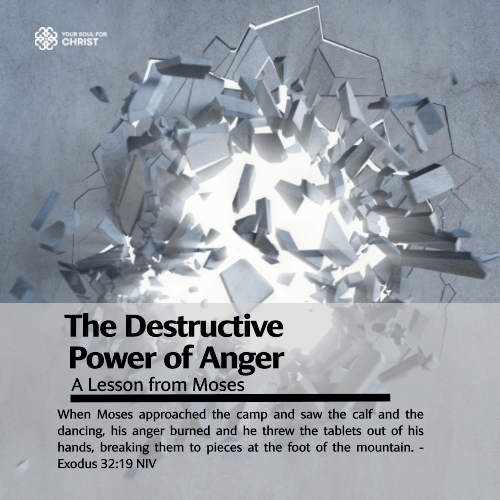When Moses approached the camp and saw the calf and the dancing, his anger burned and he threw the tablets out of his hands, breaking them to pieces at the foot of the mountain.
Exodus 32:19 NIV
In the pivotal moment captured in Exodus 32:19, we witness Moses, the revered leader, succumbing to the insidious force of anger. This event serves as a stark reminder that even the most spiritually attuned individuals can be vulnerable to the destructive power of anger. It might be tempting to believe that spiritual leaders are immune to sin. Perhaps because they spend considerable time with the Lord. However, the reality is that, as long as we inhabit this world, the possibility of sin remains. This acknowledgment, however, should never serve as justification for a person to persist in sin or indulge in it sporadically.
Anger, like cancer, has the potential to quietly spread within an individual until it permeates their being. This destructive emotion can mar, deform, and even obliterate a person, truncating the very purpose that God has ordained for their life. Numerous marriages and lives have succumbed to its detrimental effects. Likewise, emerging research suggests a potential link between anger and severe health issues, including cancer.
But Moses sought the favour of the Lord his God. “Lord,” he said, “why should your anger burn against your people, whom you brought out of Egypt with great power and a mighty hand? Why should the Egyptians say, ‘It was with evil intent that he brought them out, to kill them in the mountains and to wipe them off the face of the earth’? Turn from your fierce anger; relent and do not bring disaster on your people.
Exodus 32:11-12 NIV
In the aftermath of discovering the Israelites’ transgression, Moses, too, fell prey to anger. He had the privilege of interceding for the people to avert their destruction. Despite spending much time communing with God on the mountain and witnessing His glory, Moses was quietly consumed by anger. If only he foresaw the consequences awaiting him at the mountain’s foot, perhaps he’d have prayed for God to remove the anger’s root. Unfortunately, he didn’t. I earnestly pray that nothing will hinder God’s work in my hands, nothing will cut my destiny short, or render me incapable of reaching the promised land victoriously.
Meanwhile, the question arises: Why break the tablet merely to rebuke their sin? Could Moses have not sought God’s intervention to eradicate the seed of anger within him? Why let his ministry shatter for their unfaithfulness? If God hadn’t shown mercy, given another chance, and presented new tablets, would his ministry not have ended?
Moses, despite his intimate encounters with God, was not immune to the corrosive effects of anger. The tragedy deepens when we consider the timing and severity of the tablet’s destruction. The tablets did not break halfway, where there might have been a chance for repair or mitigation. Instead, they shattered at the foot of the mountain, almost at the culmination of Moses’ journey. A little more patience, and he could have crossed the finish line victoriously. Yet, his anger got the best of him, and the tablets were irreparably broken.
The lesson from Moses’ experience is a stark reminder of the destructive power of unchecked anger. Moses had to endure the consequences of his unbridled emotions, emphasizing the need for us to guard against the silent erosion of anger in our own lives.
In conclusion, Moses’ anger led to the tablet’s destruction and a momentary setback in his ministry. However, God’s mercy provided a second chance, illustrating the importance of patience and reliance on divine grace. This story reminds us that even in our moments of frustration, God’s mercy can restore and renew, offering a chance for redemption. Let us learn from Moses, striving to manage our emotions and trust in the enduring mercy that God extends to us.
